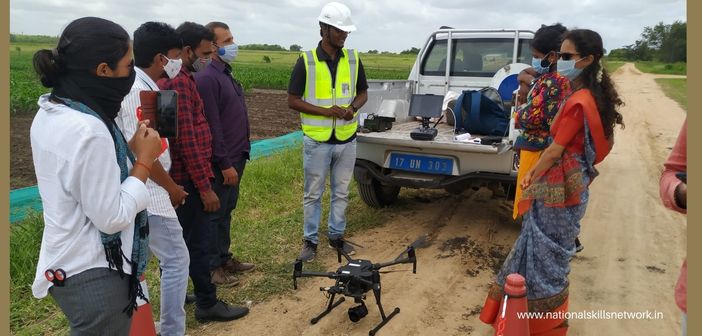The use of drones and drone technology in the agriculture sector is booming and is enormously helping farmers make informed decisions to move towards precision agriculture. Drones can overcome a variety of obstacles, speed up farmers’ hours of work, and produce high-quality food to feed a growing population. According to Frost and Sullivan, by 2030, the market for drones used in agriculture in India will be worth $121.43 million, growing at a 38.5% CAGR.
Drones are used for various agricultural purposes, from crop protection to monitoring and observation. To learn more about how drones are used in plant phenotyping, data analytics, agricultural research and many other aspects of the advanced application of drones in agriculture. We conversed with Dr. Sunita Choudhary, Agriculture Research Scientist, at ICRISAT who recently completed her drone pilot training at Telangana State Aviation Academy (TSAA) Drone Academy.
Below are a few excerpts from our conversation, you can watch the full video interview on our channel.
Q: What was your experience with drone pilot training at TSAA?
A: Drone pilot training has two components, theory and practice. We also had virtual drone training. Apart from the pilot training, the academy also acquaints us with rules and regulations for using drones, as drones fall under the purview of the Directorate General of Civil Aviation (DGCA). They also provide information on red zones and green zones for drones as prescribed by the government and help us understand where it is safe to fly and where it is not. Who to notify in case of an accident or if we find ourselves stuck anywhere are also topics covered in training. All this information and training increases the trust in our ability to fly the drone and handle it well.
Q: How is drone pilot training helping you in your agricultural research?
A. Drones are going to transform several industries, including agriculture, as they offer a variety of applications. Every industry is now exploring the use of drones and soon many of them will leverage this technology. When it comes to the use of drones in agriculture, they help in –
Use of drones in agriculture
Farm mechanization
Mechanization is a key component that consists of spraying, mapping, surveying, and modelling. Drones are highly useful in mechanizing farms.
Plant Phenotyping
Whenever we are creating a hybrid variety, it involves a lot of processes and testing. This characterization procedure is known as “phenotyping”. Drones have a lot of scope in filling the gaps in phenotyping, as technology is still limited in this area and as many things in phenotyping are done manually. With drone technology, the sensors can fly over plants and provide us with the necessary information. This helps the breeder select a higher plant height and helps them make better decisions.
For example, 10,000 different types of lines need to be characterized through the process of phenotyping. To create a product, hybrid, or line that needs tall plants, the breeder must either allocate the necessary labour to those 10,000 lines or proceed with the scale and measurement, which will take months to be completed. This is where drones can be used.
Steps involved in plant phenotyping using drones:
- Drones fly over the fields to see the design of the plot
- The image extraction or image analysis pipeline is then created where each plot can be divided
- The data is collected to show the variation in plant height much more quickly and easily, as it takes only half a day

Q: Do you see Hyderabad emerging as India’s drone hub?
A. Currently, many states do not have many avenues for drone pilot training, unlike Hyderabad. Hyderabad has provided me with the opportunity to get myself trained in flying drones, which is helping me in my research. I see a bright future for Hyderabad as many start-ups in the drone sector are coming up in the city. Nowadays, people are aware of the potential use of drones and as a result, many industries are also looking for people to hire them, making the future look bright for people getting trained in this field.
Q: How about career opportunities in the drone sector? Are there enough opportunities for women?
A: We have two components in drone technology – Hardware and Software.
Opportunities in the hardware: Drone Pilot is one of the in-demand job roles in drones, that has a lot of potential to grow. Arial photography is one activity that has a lot of potential because many people require this type of pilot who has a pilot license.
Opportunities in the software: Drone imaging, Image analysis, Mapping and surveying require specific skills to extract information from captured images.
Opportunities for women in the drone industry
Women with IT skills can participate in various fields such as image analysis, mapping, surveying, modelling, precision agriculture, and many others. Videography and photography have also developed a variety of uses, such as remote sensing validation.
Q: Could you tell us more about the role of drones in agricultural research?
A. Looking at an overview of agricultural organizations’ functions that perform to assist farmers, International Crops Research Institute for the Semi-Arid Tropics (ICRISAT) has a specialized function in which they work with small and medium farm holders in semi-arid tropical regions. By creating the best product that can fit their environment and meet their needs, we can serve them better as a result of this community. Creating a product or line that can fit into their environment is a lengthy process; at the very least, it can take five to seven years.
Drones could therefore speed up this process. The development or the selection of lines with the most suitable characters or traits served in this environment will be faster and easier if phenotyping can be done more quickly. Phenotyping, which takes a lot of time because there are many plants to choose from, is a major bottleneck in the numerous ongoing processes of this research organization. For example, if there are 10,000 plants, 5,000 are chosen in the first season, then 2,000 in the following season, and so on for seven generations.
So, although certain crops allow for multiple generations per year, others only allow for one generation, and selection is essential in both cases. When we have enough data to define qualities and we can select the “best product” and “best selection” is potentially achievable. In this way, drones will assist in characterizing more quickly and accurately. So, the most important application of drone technology is precision agriculture.
Q: Is there anything more you would like to add?
A. Farmers also confront several other issues, like pest infestations, disease outbreaks, and indicators of nutritional deficiencies. Drones can thus help with phenotyping in a variety of settings. This characterization is still in the works, but once completed, it will be handled much more effectively and precisely.














